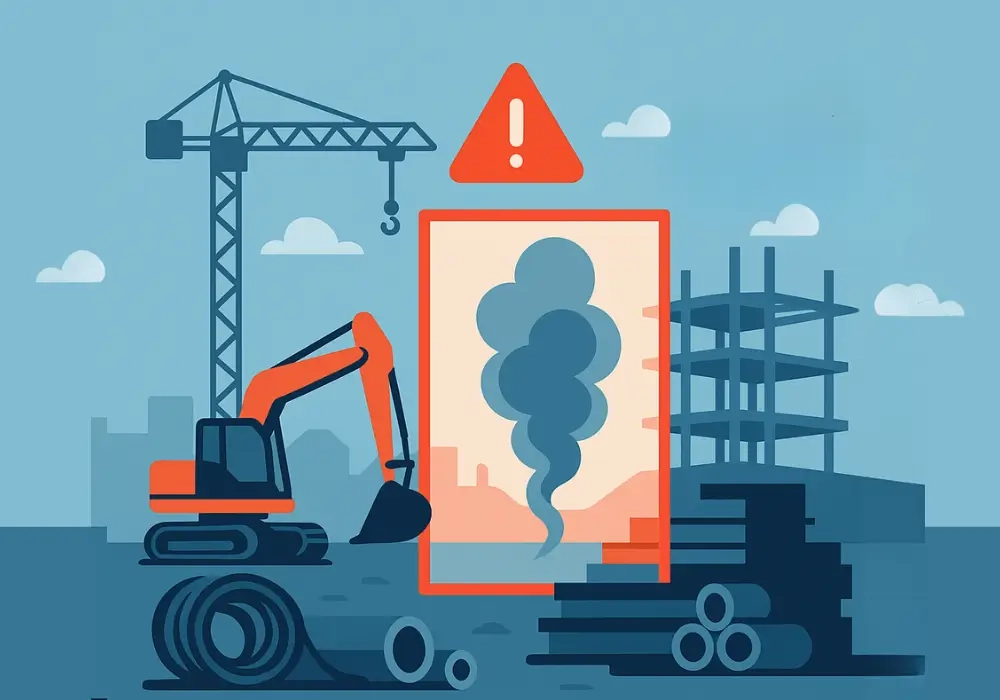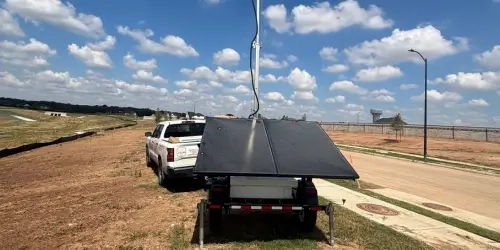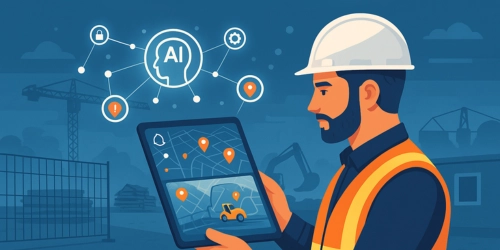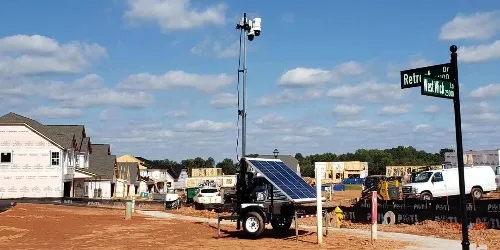Fire doesn't wait for sensors to react, especially on a busy construction jobsite. Smoke can spread through open air long before a heat detector registers danger, and by the time a traditional alarm goes off, damage may already be underway.
Smart video analytics that detect smoke and fire visually and identify early warning signs the instant something looks unusual on site is the solution. This enables faster alerts, earlier intervention, and better protection for workers, equipment, and your reputation.
In this article, we'll explore how intelligent video analytics work, why they outperform traditional sensors, and how they integrate into a connected safety ecosystem designed for today's construction jobsites.
Why Modern Construction Jobsites Face Higher Fire Risks
The construction industry has always carried fire risk, but today's jobsites make early detection especially difficult due to:
-
Temporary wiring and exposed electrical work
-
Hot works happening throughout the day
-
Fuel and material storage across the jobsite
-
Project layouts that shift every week
-
Large open-air areas where smoke dissipates quickly
A small spark in these conditions can escalate fast. After hours, the risk increases even more as wide areas go unmonitored by jobsite security.
Traditional sensors vs. video analytics
| Challenge on construction jobsites | Traditional systems | AI-video analytics |
| Dust and debris in the air | Often misread as smoke (false alarms) | Recognizes dust patterns vs. real smoke |
| Humidity and airflow | Blocks sensing chambers | Unaffected, analyzes visual changes |
| Wide, open outdoor areas | Limited range and inconsistent response | Monitors large zones from one vantage point |
| Smoke disperses before reaching sensors | Often detects too late | Catches faint, early smoke plumes |
| Early-stage fire indicators (glow, flicker, heat distortion) | Not detected until flames grow | Flags visual anomalies instantly |
| Constantly changing jobsite layout | Requires frequent repositioning | Cameras simply adjust angle, and analytics adapts |
What Is Video Analytics Technology for Smoke and Fire Detection?
At its core, video analytics is IoT-based software that uses machine learning to "teach" security cameras how to interpret what they see. The system analyzes each frame in real-time, looking for visual patterns that match early signs of smoke or fire.
That could be:
-
A thin haze drifting upward
-
A subtle shift in color temperature
-
A flicker that resembles a flame
-
The way light bends when heat starts to rise
On a construction jobsite where weather, dust, and constant activity can interfere with standard devices, having a smart security system that "watches" instead of "waits" gives teams the advantage of detecting and addressing fire risks before major damage occurs.
Read more: How IoT Improves Both Safety and IT Overview on Construction Jobsites
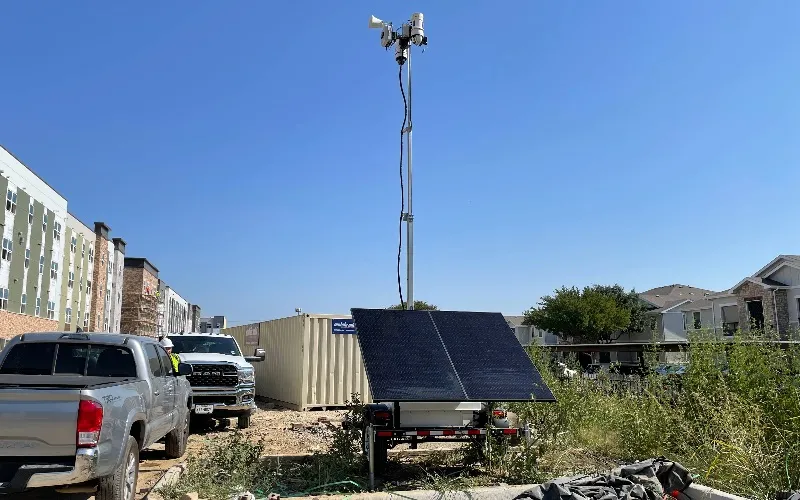
How Intelligent Video Analytics Detects Smoke and Fire Early
Detecting a fire early is all about catching the first sign that something is off. AI-video analytics does this by analyzing live footage frame by frame, while filtering out false alarms caused by dust, steam, or changes in lighting conditions.
Our Smart Detection Systems rely on advanced image processing. Cameras stream real-time footage into our cloud-based, AI-driven platform, Stellifii, which evaluates:
-
Movement patterns
-
Color shifts
-
Shape patterns
Smoke and fire detection systems, in particular, have algorithms trained specifically for challenging construction conditions. Heavy dust, bright sun, and constant equipment activity can confuse basic visual tools, but the artificial intelligence behind our systems learns how each jobsite behaves throughout the day.
As the model adapts, it becomes more effective at identifying genuine threats and filtering out false positives. When an event is flagged, the system automatically sends a snapshot and short video clip to our live monitoring partners. That instant verification ensures incidents are confirmed in minutes, not hours.
How smart smoke and fire detection systems work
Our Smoke and Fire Detection Systems operate through a simple 3-step process that combines AI, live video, and fast communication:
-
Smart detection setup: Detection zones, sensitivity levels, and alert rules are configured within each of our security cameras. This focuses the system on high-risk areas where fire is most likely to develop.
-
Continuous video analysis: AI continuously reviews live video feeds from our Surveillance Trailers and Pole Cameras, identifying visible smoke, flame flicker, and color shifts that suggest ignition. It's more responsive than traditional systems and helps reduce false alarms caused by dust, weather, debris, or lighting.
-
Real-time alerts and action: Once smoke or fire is detected, Stellifii sends an alert with a timestamped snapshot and video clip to our monitoring partners, who verify the incident in real-time and escalate the matter when needed.
5 Ways Smart Video Analytics Outperform Traditional Sensors for Smoke and Fire Detection
Traditional fire detection systems weren't built for construction environments. Smarter video analytics address the specific challenges that make jobsites different from controlled indoor spaces.
1. Faster detection across large outdoor areas
At construction jobsites, smoke rises and spreads before it ever reaches a traditional sensor. Video analytics solves this problem by watching the entire area continuously for the earliest visible signs of smoke or fire.
Our mobile surveillance PTZ (Pan-Tilt-Zoom) cameras analyze movement, color shifts, and light distortion to spot the first indication of ignition. Because our Surveillance Trailers cover wide, open zones, these systems detect small anomalies quickly and verify them in real-time.
2. Higher accuracy and fewer false alarms
Traditional smoke sensors struggle on windy, dusty, or humid jobsites, which often leads to nuisance alarms. Video analytics, however, can distinguish between dust kicked up by a loader and the movement signature of smoke or flames.
3. 24/7 visibility
Cameras equipped with infrared (IR) and low-light technology capture usable footage even in near-dark conditions. Video analytics interprets this information just as effectively as during daylight, spotting early heat signatures that would otherwise go unnoticed until morning.
4. Early warning that reduces damage and liability
When hazards are caught early, response teams have more time to act, and that directly reduces:
-
Equipment loss
-
Structural damage
-
Safety risks
Video analytics buys that time by noticing threats before they develop into something destructive.
5. Smooth integration with other smart detection tools
Video analytics becomes even more powerful when paired with other intelligent systems. On integrated jobsites, smoke and fire detection can work alongside:
When all of this feeds into a single ecosystem, teams get a more reliable picture of risks happening in real-time.
Read more: How Smart Monitoring Saves Construction Jobsites Money
How Mobile Surveillance Hardware Supports Advanced Video Analytics
Video analytics is only as strong as the hardware supporting it. On a construction jobsite, cameras need the right height, angle, stability, and power source to capture clear footage.
Mobile surveillance gives video analytics the visibility it needs to detect smoke or fire at the earliest possible moment, no matter how often the jobsite layout changes.
Surveillance trailers
Solar surveillance trailers lift cameras to an optimal operating height (typically 18-20 feet), high enough to create long, uninterrupted sightlines across the jobsite. They run on solar power, ensuring continuous operation.
Why that height matters for analytics:
-
Reduces blind spots caused by machinery, storage units, or temporary structures
-
Allows the AI to track smoke spread horizontally and vertically
-
Increases the detection radius
-
Maintains visibility during windy conditions.
-
Prevents vibration, as shaky footage can weaken the accuracy of frame-by-frame analysis
Pole cameras
Our Pole Cameras fit directly to existing structures like poles, walls, lighting columns, or temporary fixtures, giving analytics a stable, bird's-eye view of the areas where fire risks tend to concentrate.
Why they work so well with video analytics:
-
Stable mounting reduces vibration
-
Consistent angle and field of view let AI track changes and detect anomalies
-
Elevated placement improves the line of sight
-
Rapid deployment allows cameras to move as jobsite layouts evolve
-
Built-in 4G/5G cellular connectivity means no dependency on on-site networks
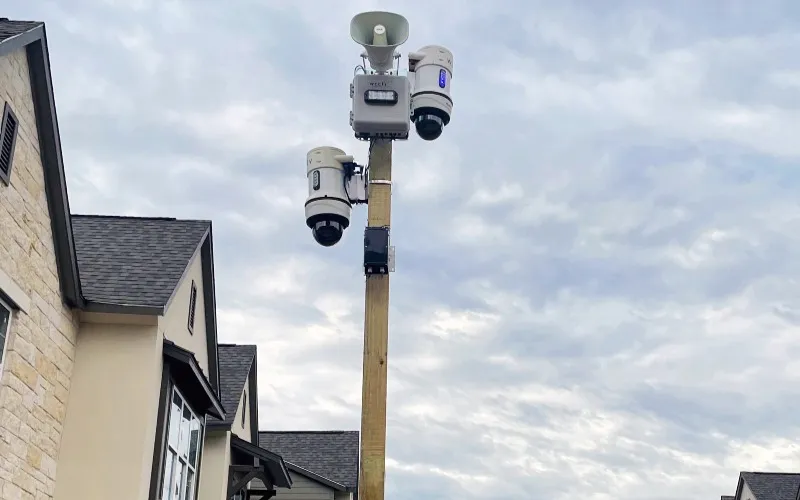
The Stellifii Advantage
Stellifii is our in-house, cloud-based platform that ties all Mobile Surveillance Units, Smart Detection Systems, and Environmental Sensors into a single, easy-to-use system. Each of our monitoring solutions connects directly to Stellifii over 4G or 5G, allowing construction teams to access footage, system health checks, and analytics at any time.
Beyond live monitoring, Stellifii also provides time-stamped, exportable data that supports insurance claims, compliance checks, and internal audits. Every event, whether it's smoke detection or an intrusion alert, is logged automatically with visual evidence and detailed data.
During the day, Stellifii gives crews full oversight of:
-
Video feeds
-
Weather conditions
-
Air quality
-
Noise levels
At night, the platform switches to AI-driven protection:
-
Identifies smoke movement
-
Spots intrusions
-
Captures evidence
-
Escalates real-time alerts when something needs attention
How Stellifii supports fire and smoke detection
| Stellifii's capability | How it helps with smoke and fire detection |
| Live video verification | Confirms whether alerts are genuine by showing the smoke or glow instantly. |
| AI-driven detection | Identifies smoke patterns, heat signatures, and early visual changes. |
| Real-time alerts | Sends immediate notifications to supervisors or monitoring teams with video snapshots. |
| Remote actions | Allows teams to trigger sirens or voice-down warnings to prevent escalation. |
| Environmental data | Shows wind speed, lightning, humidity, and extreme temperatures that affect fire spread. |
| Event logging and reports | Automatically records timestamps, footage, and conditions for investigations or insurance. |
| Multi-site oversight | Monitors smoke and fire risks across several jobsites from one login. |
With Stellifii connected to every WCCTV unit, the system can spot even the thinnest smoke trail on the camera feed, verify it with AI, and send out a real-time alert within seconds. A remote audio challenge is then triggered while the monitoring team reviews the footage. Ultimately, the fire service will be called before the flames spread.
Bringing Faster, Smarter Fire Protection to Your Jobsite
Traditional security systems detect fire after it has already started. Video analytics, supported by Stellifii and WCCTV's surveillance hardware, alerts you when the earliest sign of smoke appears so you take immediate action.
With over 20-years of experience in mobile surveillance, we understand how destructive fire hazards can be in the construction industry. Our smart smoke and fire detection systems are designed and configured to meet any security requirement, ensuring early detection and faster response when it matters most.
Want faster, smarter protection for your jobsites? Contact us today so you can start identifying risks before they become incidents.
